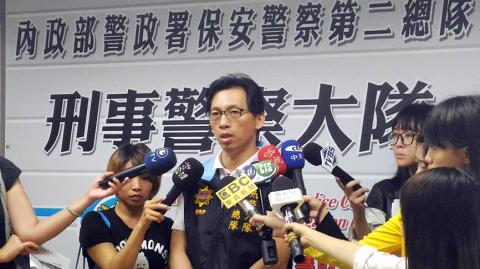Judicial authorities yesterday said that they have charged five men who allegedly stole intellectual property from a Tainan nanotechnology company and set up competing nanotechnology plants in China with breaching the Trade Secrets Act (營業秘密法).
The Second Special Police Corp, under the National Police Agency, announced details of the investigation yesterday, saying it is the first investigation and prosecution under the act since it was implemented in 2013.
Police said that they detained three former Hsin Fang Nano Technology Co (新芳奈米科技) employees, including a former plant manager surnamed Chen (陳) and a production section chief surnamed Yu (尤), along with two other business associates.

Photo: Huang Chien-hua, Taipei Times
“The estimated financial loss to our company is about NT$2.6 billion [US$81.08 million]. We urge the government to crack down on intellectual property theft against Taiwanese businesses,” chairman Chang Jen-hung (張仁鴻) said.
Hsin Fang is a grinding mill machine manufacturer, which are used to produce ultra-fine nanopowders for use in pharmaceuticals, cosmetics, consumer electronics, health food, anti-radiation coating, military weapons and in other industrial applications.
Company officials said their nanopowder grinding mill, which incorporates an innovative “dry cryo-nanonization grinding system,” received a top award at a nanotechnology exhibition in Tokyo in 2012, and honors at other industry fairs in Taiwan and other countries.
The investigation in 2014 followed reports that Chen, Yu and other former employees, backed by business associates, started a new company in Yunlin County — Unicat Nano Advanced Materials & Devices Technology Co (環美凱特).
Unicat Nano later moved to Chongqing, China, setting up nanotechnology businesses that, according to investigators, were based on intellectual property stolen from Hsin Fang by Chen, Yu and other former employees.
The Public Security Police Brigade investigation unit last year launched raids to gather evidence at offices, company plants and residences in Yunlin, Tainan and New Taipei City, where they took in suspects for questioning and confiscated computers, files and powder mill machines.
Although the former Hsin Fang employees denied the accusations, prosecutors said they have gathered sufficient evidence and announced the charges against the suspects.
Chang said Hsin Fang’s 15 years of investment in research and development has been wasted because of the theft.
“The government must do something about it, because intellectual property theft will do grave damage to Taiwan’s technology industries,” he said.

The Taiwanese passport ranked 33rd in a global listing of passports by convenience this month, rising three places from last month’s ranking, but matching its position in January last year. The Henley Passport Index, an international ranking of passports by the number of designations its holder can travel to without a visa, showed that the Taiwan passport enables holders to travel to 139 countries and territories without a visa. Singapore’s passport was ranked the most powerful with visa-free access to 192 destinations out of 227, according to the index published on Tuesday by UK-based migration investment consultancy firm Henley and Partners. Japan’s and

NATIONAL SECURITY THREAT: An official said that Guan Guan’s comments had gone beyond the threshold of free speech, as she advocated for the destruction of the ROC China-born media influencer Guan Guan’s (關關) residency permit has been revoked for repeatedly posting pro-China content that threatens national security, the National Immigration Agency said yesterday. Guan Guan has said many controversial things in her videos posted to Douyin (抖音), including “the red flag will soon be painted all over Taiwan” and “Taiwan is an inseparable part of China,” while expressing hope for expedited “reunification.” The agency received multiple reports alleging that Guan Guan had advocated for armed reunification last year. After investigating, the agency last month issued a notice requiring her to appear and account for her actions. Guan Guan appeared as required,

Japan and the Philippines yesterday signed a defense pact that would allow the tax-free provision of ammunition, fuel, food and other necessities when their forces stage joint training to boost deterrence against China’s growing aggression in the region and to bolster their preparation for natural disasters. Japan has faced increasing political, trade and security tensions with China, which was angered by Japanese Prime Minister Sanae Takaichi’s remark that a Chinese attack on Taiwan would be a survival-threatening situation for Japan, triggering a military response. Japan and the Philippines have also had separate territorial conflicts with Beijing in the East and South China

A strong cold air mass is expected to arrive tonight, bringing a change in weather and a drop in temperature, the Central Weather Administration (CWA) said. The coldest time would be early on Thursday morning, with temperatures in some areas dipping as low as 8°C, it said. Daytime highs yesterday were 22°C to 24°C in northern and eastern Taiwan, and about 25°C to 28°C in the central and southern regions, it said. However, nighttime lows would dip to about 15°C to 16°C in central and northern Taiwan as well as the northeast, and 17°C to 19°C elsewhere, it said. Tropical Storm Nokaen, currently